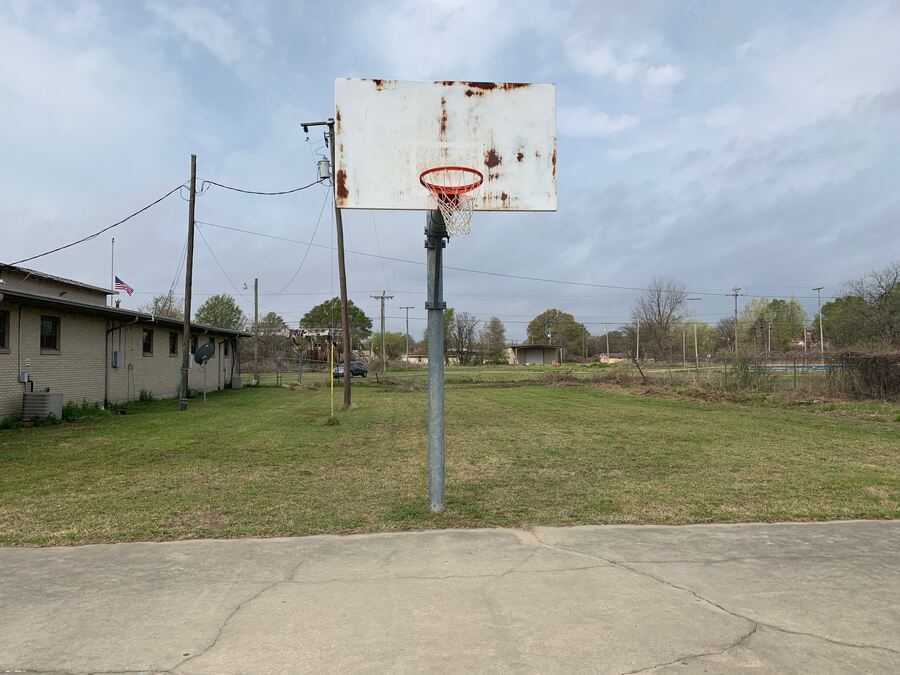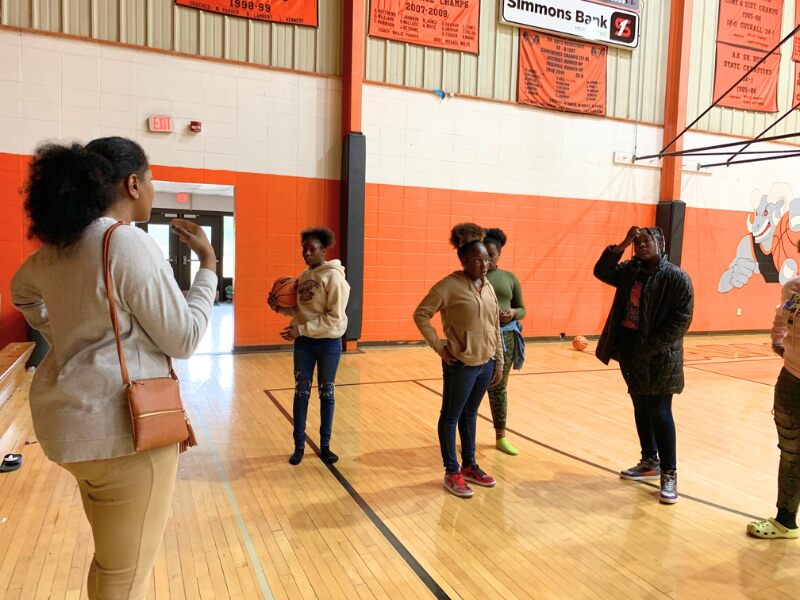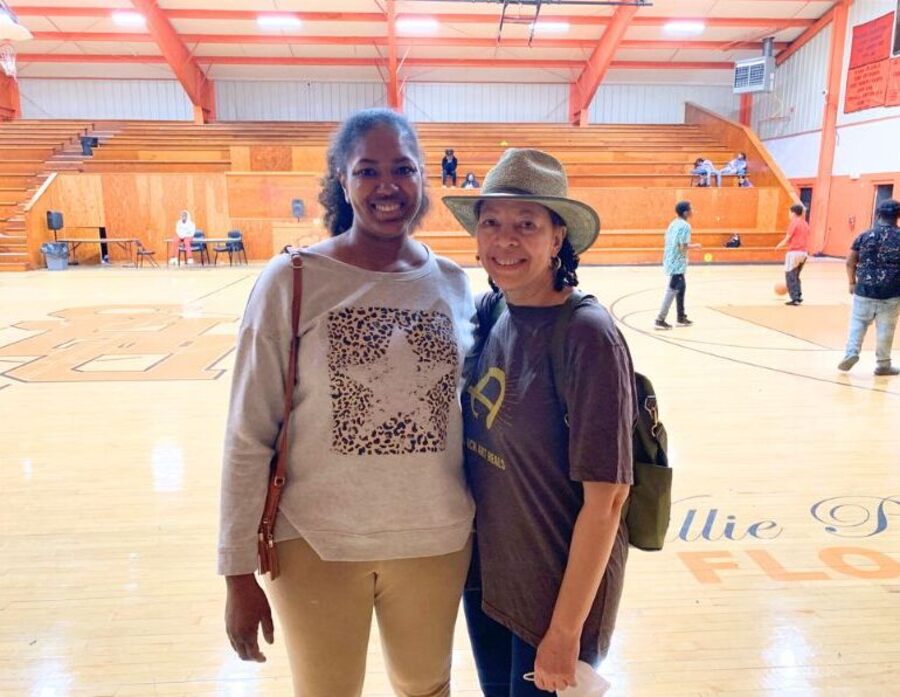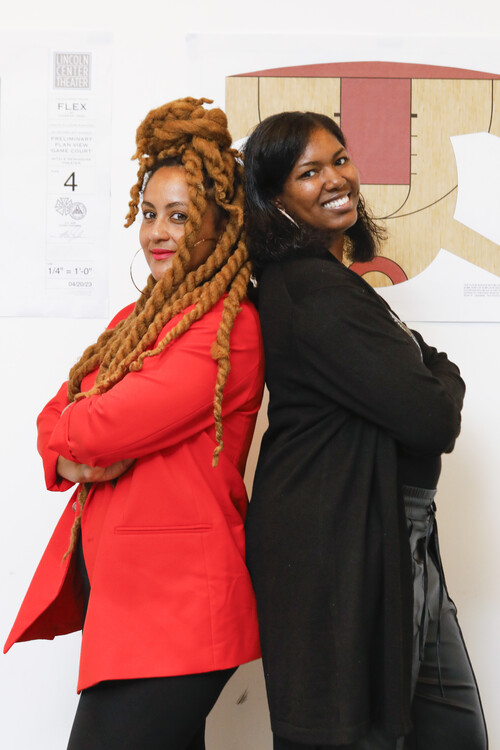Flex, Candrice Jones’s play about an ambitious girl’s high school basketball team in rural Arkansas, is on the move. In the past year, the team known as the Lady Train has journeyed from its co-world premiere at Northwest Arkansas’s Obie-winning TheatreSquared and at Atlanta’s Theatrical Outfit, and now to New York City’s Lincoln Center Theater, where it’s currently in previews, to open officially on July 20. Under the inspired direction of LCT resident director Lileana Blain-Cruz, the Lady Train’s New York debut feels almost miraculous, given the blindsiding bumps it hit along the way.
Jones’s play is set in the year 1997, the inaugural year of the Women’s National Basketball Association (WNBA). This momentous event beams a beacon of hope to a group of young Arkansas women, who see winning their state tournament as a ticket out of a dead-end existence in a town where the options are working in a spice factory or at local prisons, or enlisting in the military. But before these young women can get to state, they must overcome a formidable obstacle—i.e., a star player is pregnant, and the coach does not allow pregnant girls to play.
Flex’s developmental journey began when Candrice brought an early draft into a playwriting workshop I conducted for Voices of the Nation (a.k.a. VONA) in the summer of 2017. VONA produces the country’s only multi-genre writing conference specifically for writers of color. Our dramaturgical collaboration continued after the workshop into the following summer, when Flex was among the roster of plays developed at Berkeley Rep’s Ground Floor Residency. In 2019, Flex was at the Bay Area Playwright’s Festival prior to being selected for the 2020 Humana Festival at Actors Theatre of Louisville.

In Louisville, the cast worked with a professional coach on polishing their basketball skills (as they would do years later in New York), in addition to rehearsing their roles with the play’s director. But two days prior to Flex’s anticipated world premiere, ATL suspended all performances due to COVID-19. Given the intense rehearsal schedule and the demands of tech, the reality of the enveloping pandemic had not penetrated the productions’ bubble—until it burst. When the cast gathered on Mar. 18, 2020, at a downtown Louisville restaurant, to celebrate director Delicia Turner-Sonnenberg’s birthday, the celebration felt more like a wake.
This shutdown was especially hard on Candrice, as the Humana premiere would have marked her first full production as a playwright. As the months passed, she busied herself writing and developing new scripts. Eventually she was contacted by Dexter Singleton, director of play development at Fayetteville’s TheatreSquared. He wished to develop the script at the Arkansas New Play Festival, and, if all went well, to premiere the play the following summer (with Turner-Sonnenberg back as director).
Arkansas is ranked the second poorest state in the nation, just behind neighboring Mississippi. So I was somewhat taken aback upon arriving at the award-winning modern architectural facility that houses TheatreSquared. Artistic director Robert Ford and executive director Martin Miller had leveraged the resources to build a stunning wish-list facility with two state-of-the-art performance spaces on the ground level, and a flexible rehearsal and performance space upstairs. Remarkably, TheatreSquared managed to continue producing a full season even as the pandemic raged.
On the day of the new-play festival’s staged reading of Flex in summer 2021, it played to a large, enthusiastic (masked) audience in attendance. At the conclusion of the reading’s talkback, one audience member shouted, “Let’s take this train all the way to New York!” Prophetic words indeed.


Fast forward to the spring 2023. As part of the dramaturgical research for the Lincoln Center Theater production, I’m taking a road trip to the playwright’s hometown of Dermott, Ark., to see how it informed her play. The plan is to rendezvous with Candrice in Little Rock, then set off to Dermott the following morning. Candrice calls to remind me that Fayetteville, which is a well-resourced university town, is “a bubble,” warning me of “sundown towns” I will be passing through, where I should not stop under any circumstances. “Travel with a full tank of gas,” she intones. I am heading out of the Ozarks into the Deep South.
Along the freeway I spot some curious signs. One points out the road to the town of Toad Suck. Large billboards feature Donald Trump, standing alongside a uniformed military officer, warning against the use of electronic balloting machines. (They all say “President Trump,” as though he is still in the White House. Time warp.)
One of the reasons I feel compelled to visit Dermott is because I have been told repeatedly that the Arkansas Delta, where Flex is set, is nothing like Fayetteville, my only Arkansas point of reference. I am also aware that major cultural icons hail from the Delta region: Sister Rosetta Tharpe (whose music is featured in the production), Johnny Cash, Basketball Hall of Famer Scottie Pippin, and playwright Endesha Ida Mae Holland.
During my time in Dermott (pop. 1973 and shrinking), Candrice drives us to many of the locations referenced in the play. We pass the Piggly-Wiggly on our way into town, and we drive by the Morris-Booker Community College, now permanently closed. There are two prisons in the area, a federal and a state facility. We drive in search of dirt basketball courts, only to discover that they have now all been paved over.

Having read that the Delta encompasses the state’s highest concentration of poverty, I quickly deduce that rural poverty does not necessarily resemble urban poverty. There are no unhoused people and no panhandlers to be seen. But the markers of prosperity and development that were so visible in Fayetteville are glaringly absent. Motels, grocery stores, and restaurants are in short supply. Abandoned houses are noticeable, their roofs caving in from lack of upkeep.
On the plus side, the Delta is a treat for the senses, as the soothing sounds of crickets and chirping birds fill the air. Heading out of downtown, I inhale the smell of the rich, dark soil visible in the wide open fields under limitless blue skies. We in the Dirty South, y’all! This is the region that inspired a Kesselring Award-winning play.
On our final day we visited Dermott’s public school, whose campus encompasses kindergarten through grade 12. Candrice’s entire senior class comprised 25 students. Entering through the front doors, we pass through hallways lined with glass cases full of trophies. The gymnasium walls are adorned with individual life-sized banners of uniformed male and female basketball players. Groups of eighth graders file in for physical education and immediately begin shooting baskets.
Candrice engages with a group of girls, asking them their family names, then telling them whose aunt or cousin she played on the team with. While this is happening, one of the girls begins nonchalantly spinning the basketball on the tip of her index finger, Harlem Globetrotter-style. This is when it fully dawns on me how deeply ingrained basketball culture is in this town.
For our visit, we stay in the gracious two-story home where Candrice and her siblings grew up. Railroad tracks border the expansive backyard. It is this proximity that inspired Candrice to name the team in the play the Lady Train. An apt name it turned out to be for the journey that was to come.

Candrice has done a masterful job of maximizing every opportunity to further develop the script. At TheatreSquared, when the final shot that determined the outcome of the championship game was taken, the stage went to black. When the lights came up audiences saw the Lady Train holding their trophy.
At Lincoln Center Theater, by contrast, the audience follows the championship game action quarter by quarter as though they are at courtside. And when the final shot is taken, hit or miss, it determines how the play ends for that performance. When I attended one of the two performances that ended with a “loss,” I was impressed to see that the losing ending was equally if not more moving than the “win.”
Blain-Cruz is an ideal director for this play because of her highly physical approach to staging. She begins each rehearsal with movement and utilizes bumping dance music as an energizer when needed. “I do not underestimate the amount of focus, concentration, and stamina that this show takes—bravo!” she told the actors after their first full run-through.
Flex may be best understood as Candrice’s love letter to women of the rural South. One homage that would be recognizable only to residents of the Delta is the story that the Lady Train’s coach tells about winning the state championship with only four girls on the court. Candrice told me that this is in fact a true story—a feat accomplished by Gloria Harris, legendary coach of the Delta Lady Pirates.


In addition to basketball, the music in Flex provides another portal of entry into the world of the play. Songs like Montell Jordan’s “This Is How We Do It,” Kurtis Blow’s “Basketball,” Aliyah’s “Are You That Somebody,” and Xscape’s “Just Kickin’ It” transport me back to the ’90s, when I joined the artistic staff of the Tony-winning Hartford Stage in Connecticut. I accepted the position of director of play development to help open the door for underrepresented writers in American theatre. (I knew of only one other person of color in a similar position at a mainstream theatre at the time). Back then, the plays being produced by writers of color in mainstream theatres at the time were typically works that would not challenge the subscriber audience’s assumptions about minority cultures. I knew there were much more impactful stories that were being overlooked and writers who were falling through the cracks.
Working closely at Hartford Stage with then artistic director Mark Lamos and resident director Bart Sher (currently resident director at Lincoln Center Theater) we succeeded in attracting the audience that every regional theatre claimed they wanted—one that reflected the diversity of its community. We had all ages, races and backgrounds on our stages and in our seats. I’ve often referred to my time at Hartford as my “Camelot” moment. And like the legendary Camelot, it didn’t last.
Riding the Lady Train into Lincoln Center has been a particularly satisfying experience for me, as it bookends the work I started at Hartford Stage. Candrice Jones exemplifies a compellingly authentic voice, staging facets of Black Southern life not widely seen on American stages until now. I doubt that this production could have happened as recently as five years ago. For one thing, Blain-Cruz, who chose to direct it, has only been a resident director at Lincoln Center Theater since 2020. As in the play, the winds of change are blowing. Let us see how far they can take us.
Kim Euell is an Ashland/Bay Area-based playwright, dramaturg, and educator who teaches theatre and film courses at the University of Southern Oregon. She is the co-dramaturg for Flex at Lincoln Center Theater.


